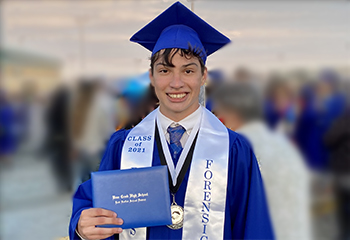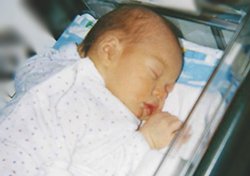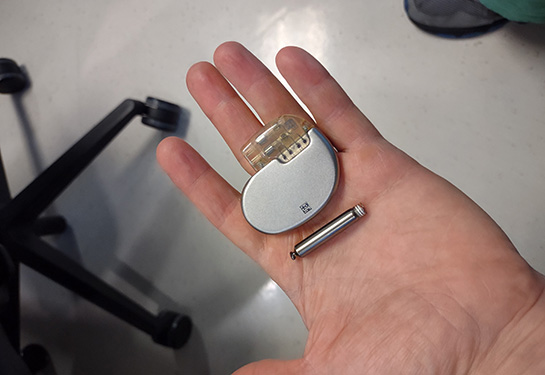Overcoming the odds despite challenges of spina bifida
Now 17, Ben Brogger embraces bright future ahead
Every graduation ceremony includes speeches from a graduating senior or two. Attendees expect that.

But at this year’s Bear Creek High School graduation ceremony in Stockton, 17-year-old Ben Brogger defied others’ expectations and the odds.
When he walked gracefully on to the stage to deliver an inspiring speech to fellow graduates, it was a moment that his parents, Adriana and Dan, weren’t sure they would ever witness. Ben Brogger was born with spina bifida.
“Now I can recognize Ben’s gait anywhere. He walks with confidence. He has a swagger. It’s incredible to see. If you didn’t know he had spina bifida, you may not realize from seeing him,” said his mom, who remembers her son’s early days when she was told he might be wheelchair-bound for life.
Ben Brogger has been breaking barriers like this since day one. Once told he might never walk, he began walking at 15 months, then running. In high school, he followed in the footsteps of his two older brothers and joined the varsity wrestling team in high school.
“The biggest blessing with Ben is that he refuses to see spina bifida as something that will hinder him. He is such a resilient human being,” Adriana Brogger said. “When I think back to those early days, I was just clinging to hope and wanting to know what his future could look like. Now we’ve reached his high school graduation, I see there is still so much to look forward to in his future.”
An explanation with a dose of humanity
Adriana Brogger was seven months pregnant when a routine ultrasound revealed that something was wrong with her third son. Doctors initially thought her developing baby had anencephaly, a congenital condition in which parts of the brain and skull are missing. She was referred to UC Davis Health by her obstetrics and gynecology doctor in Stockton. Additional testing confirmed her baby had myelomeningocele, also known as spina bifida.
Spina bifida occurs when spinal tissue fails to fuse properly during the early stages of pregnancy. It can lead to a range of lifelong cognitive, mobility, urinary and bowel disabilities. It affects 1,500 to 2,000 children in the U.S. every year.
“When I heard it was myelomeningocele, it seemed so foreign and I felt disconnected from it. I fell into a depression, but I have a lot of faith. I said that God will see us through this,” Adriana Brogger said. “I listened to the specialists at UC Davis. Everything they explained to me came with a dose of humanity. It was comforting during a difficult time.”
Benjamin Brogger arrived, via scheduled caesarean section, weighing 7 pounds, 12 ounces. Hours later, UC Davis pediatric neurosurgeon James Boggan began operating to repair Ben’s spine.
“Dr. James Boggan was my angel, who performed surgery on his teeny, tiny little body,” Adriana Brogger said. “Dr. Boggan was so kind, so quiet and calm. He told me, ‘Your baby is going to be okay. What we will try to do in this surgery is close this up and connect these nerve endings.’”
The path to a bright future
The surgery was successful – the first of many successful surgeries – what Adriana Brogger calls miracles – that would set her son onto a path with a bright future.

Benjamin Brogger had surgery to repair his spina bifida shortly after birth.
Many babies with spina bifida have fluid in the brain (also known as hydrocephalus), which can require shunt placement. Ben Brogger did not need a shunt.
Doctors diagnosed Ben Brogger with chiari malformation type II. This condition can affect the ability to swallow. Fortunately, it did not pose a problem for him. His mother was able to nurse him from birth, providing nutrient-rich breastmilk to help him grow and develop.
Boggan would continue to care for Ben Brogger for many years, always working to preserve and maximize his patient’s neurological function and independence.
“Ben’s care was made easy by his determination and perseverance and his family’s faith,” Boggan said. “The dedicated multidisciplinary team of specialists worked together to provide Ben’s family with the support they needed.”
Specialists like UC Davis pediatric urologist Eric Kurzrock performed multiple surgeries on Ben over the years.
“When you care for children from infancy to adulthood, they become family. Patients with neurogenic bladder (bladder problems caused by neurologic damage) and bowel disorders require constant and intense attention from their family and providers. So much can go wrong,” Kurzrock said.
But in Ben Brogger’s instance, so much went right. He underwent surgeries that included an antegrade continence enema (ACE) procedure and bladder augmentation surgery. They gave him the gift of independence and autonomy and freed him from needing a colostomy.
“Ben is blessed with parents who are compassionate, informed and proactive. We spent years discussing different surgical options and the many risks,” Kurzrock said. “Thankfully the reconstruction was successful and Ben has the opportunity to chase his dreams.”
Those dreams now include becoming a lawyer. He heads to San Joaquin Delta College in the fall to join the Pathway to Law program.
Ben’s parents weren’t the only ones watching with pride on his graduation day this month. His UC Davis pediatric neurosurgeon Marike Zwienenberg also watched the ceremony online with pride. Seeing patients celebrate big and small victories is part of the joy of being a pediatric surgeon, said Zwienenberg.
“Living with spina bifida is challenging and Ben has picked every opportunity along the way to overcome it, which says a great deal about his character and grit,” Zwienenberg said. “Dr. Boggan provided excellent surgical care to him as an infant. On behalf of our health care system, I am super proud we have been able to support him where needed.”




